Wednesday Feb 18, 2026
Wednesday Feb 18, 2026
Friday, 21 August 2020 00:00 - - {{hitsCtrl.values.hits}}
“Liberal democracy is rooted in the rights of individuals, and not the rights of groups or fixed communities. Liberal democracy cannot exist without a national identity that defines what citizens hold in common with one another. 
Given the de facto multiculturalism of contemporary democracies, that identity needs to be civic or creedal. That is, it needs to be based on liberal political ideas that are accessible to people of different cultural backgrounds rather than on fixed characteristics such as race, ethnicity, or religion.” – Francis Fukuyama.
Human beings have a fundamental need to belong – a need that their collective identities, be it racial, ethnic, religious, regional, or national, would often satisfy. Such affiliations, which psychologists call “social identities,” serve multiple psychological functions. These include, for example, the need for a sense of safety, which social identities satisfy by reducing uncertainty and providing norms that help people navigate everyday life.
Some social identities also offer rituals and customs to aid with loss, mourning, and other significant challenges that occur during the course of one’s life. (This relates to the Sri Lankan Government’s ignoring international guidelines on COVID-19 death disposal and mandating cremation in Sri Lanka for all COVID-19 deaths). This caused the social identity of a group of Sri Lankan’s to be ignored based on contested scientific evidence thus scarring the psyche of Sri Lankan Muslims for generations to come. At times, identities provide a sense of purpose and meaning and a basis for esteem and regard that is larger than people’s individual selves.
Identities efficiently satisfy the human need for respect and dignity.
The concept of “identity,” builds on a universal aspect of the human psyche that Plato labelled “thymos”, the demand for respect for one’s inner dignity. But there is a specifically modern expression of thymos that emerged after the Protestant Reformation and that values the inner self more highly than society’s laws, norms, and customs and insists that society change its own norms to give recognition to that inner self.
The first major expression of modern identity politics was nineteenth-century European nationalism, when cultural groups began to demand recognition in the form of statehood. Francis Fukuyama argues that identity politics is eroding national unity in the United States and Europe, undermining the kind of civil discourse essential to the maintenance of liberal democracy.
I believe that much of modern Islamism is similarly driven by identity confusion among Muslims in modernising societies who feel neither Western nor traditional and see a particular form of politicised religion as a source of community and identity.
We saw this in the movement which led to the Easter Carnage of 2019 in Sri Lanka. The ideological, political and social infrastructure which gave rise to the Easter Carnage is still not only existing but thriving in Sri Lanka thanks to identity politics of the majority and minority Muslim Community.
The prime reason for this situation is the current Sri Lankan constitution which calls for proportional representation at a threshold of 5% of the votes polled. If this situation persists the identity politics and all that it leads to will continue to persist and thrive in Sri Lanka. Politicians to clergy and all in between will exploit this situation for their individual expectations at the cost of national issues.
I believe that identity, in the recent past, has begun to focus on the rise of right-wing nationalist populism or vice versa. This development threatens liberal democracy because populist leaders seek to use the legitimacy they gain from democratic elections to undermine liberal institutions such as courts, the media, and impartial bureaucracies which minorities rely on for a sense of equity and all citizens rely
on for fair-play.
The contemporary Middle East, like the Balkans before it, is an extreme example of out-of-control identity politics and what ultimately happens to countries that do not invest in integrative national identities. We must take all precautions to not go down this path in Sri Lanka.
We in Sri Lanka have an unparalleled and unique opportunity to exploit. With the election of the populist SLPP which used identify politics of the majority (thus reverse engineering the traditional interpretation of identity politics often associated with politically marginalised minority groups) to establish a politically stable governing environment, the State should use this platform to solidify liberal democracy in Sri Lanka by working towards creating a national identity that defines what citizens hold in common with
one another. Not doing so at this point of time will lead to a situation of identity politics going on steroids. I conclude by once again quoting Fukuyama who warns that ‘fragmenting into segments based on ever-narrower identities, threatening the possibility of deliberation and collective action by society as a whole‘.
If we go done the current path of identity based politics we in Sri Lanka are most likely to fulfil this prophecy.
People will never stop thinking about themselves and their societies in identity terms. But people’s identities are neither fixed nor necessarily given by birth. Identity can be used to divide, but it can also be used to unify. That, in the end, will be the remedy for the populist politics of the present.
We need a national level effort and program to address these issues in a Sri Lankan manner and I firmly believe that a State led declaration of a ‘Year of Tolerance’ will be a good starting point and foundation to use identity as a tool to unite all Sri Lankans to become one, out of many.